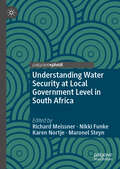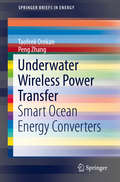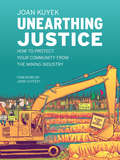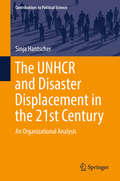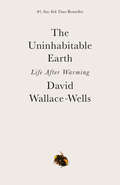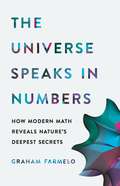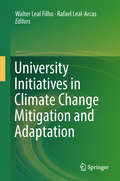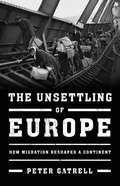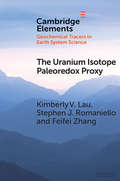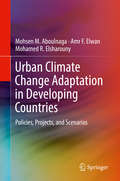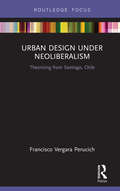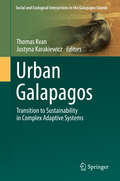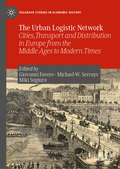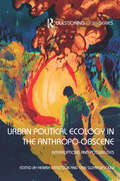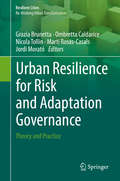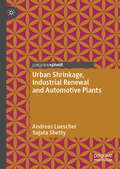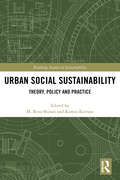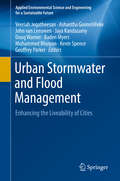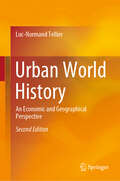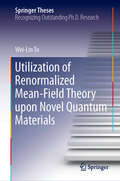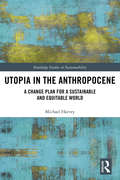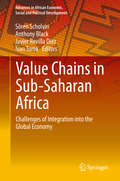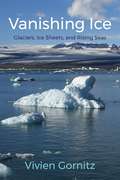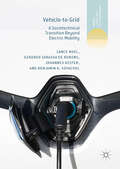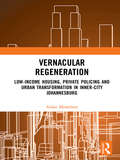- Table View
- List View
Understanding Water Security at Local Government Level in South Africa
by Richard Meissner Nikki Funke Karen Nortje Maronel SteynThis book provides unique insights into the complex issue of water security in South Africa. Based on qualitative research conducted through face-to-face structured interviews and focus group discussions with individuals, traditional leaders, municipal officials, researchers, businesspeople and farmers in the two local governments – the Sekhukhune District and eThekwini Metropolitan Municipalities – it focuses on the peoples’ understanding of the concept of water security and whether they believe that the municipalities have achieved water security for all. The research is supported by water security-related statistics, particularly those pertaining to water quality and quantity, and an extensive literature review for the concept of water security. In addition to assessing the state of water security in both municipalities, the book presents a new water security definition and typology, and offers valuable recommendations for future research.
Underwater Wireless Power Transfer: Smart Ocean Energy Converters (SpringerBriefs in Energy)
by Taofeek Orekan Peng ZhangThis book discusses, for the first time, wireless power transfer in the ocean environment. Topics covered include power electronic techniques, advanced control strategies, as well as classic and emerging applications such as smart ocean energy systems and wireless power transfer and charging of underwater autonomous vehicles. Emerging research topics are presented, along with methodologies, approaches, and industrial development of intelligent and energy-efficient techniques. Apart from the basic principles with an emphasis on inductive power transfer and mathematical analysis, the book discusses the emerging implementation for underwater wireless power transfer such as energy encryption, power and data transfer through common links, and secured data- and cyber-security. Specifically, the book comprehensively introduces significant discussions on UWPT coil theoretical and experimental analysis in seawater, optimal design, and intelligent controls. For example, since fast communication is not viable in an underwater environment, the proposed book discusses Maximum Power Efficiency Tracking (MPET) control, which achieves a maximum power efficiency (>85%) without communication or feedback from the transmitting side of the UWPT system. A k-nearest-neighbors-based machine learning approach is used to estimate the coupling coefficiency between the coils. This machine learning-based intelligent control method can offer important guidance for graduate students, academic researchers, and industrial engineers who want to understand the working principles and realize the developing trends in underwater wireless power transfer. Finally, the book includes details on the modeling and design of a smart ocean energy system--a new type of power harvesting system designed to convert ocean energy into electricity, which has the capability of making underwater wireless power connections with distributed marine devices.
Unearthing Justice: How to Protect Your Community from the Mining Industry
by Joan KuyekThe mining industry continues to be at the forefront of colonial dispossession around the world. It controls information about its intrinsic costs and benefits, propagates myths about its contribution to the economy, shapes government policy and regulation, and deals ruthlessly with its opponents. Brimming with case studies, anecdotes, resources, and illustrations, Unearthing Justice exposes the mining process and its externalized impacts on the environment, Indigenous Peoples, communities, workers, and governments. But, most importantly, the book shows how people are fighting back. Whether it is to stop a mine before it starts, to get an abandoned mine cleaned up, to change laws and policy, or to mount a campaign to influence investors, Unearthing Justice is an essential handbook for anyone trying to protect the places and people they love.
The UNHCR and Disaster Displacement in the 21st Century: An Organizational Analysis (Contributions to Political Science)
by Sinja HantscherThis book offers an in-depth case study on the leading international refugee agency, the United Nations High Commissioner for Refugees (UNHCR), and its approach to environmentally displaced persons. The author examines the UNHCR on the basis of expert interviews and content analysis in order to highlight why and how the organization is addressing the issue. The analysis draws on organizational as well as security theory, offering readers a better understanding of the connection between the two. The book appeals to scholars in the fields of migration and organizational studies, as well as policymakers and professionals working in international organizations.
The Uninhabitable Earth: Life After Warming
by David Wallace-WellsIt is worse, much worse, than you think. If your anxiety about global warming is dominated by fears of sea-level rise, you are barely scratching the surface of what terrors are possible. In California, wildfires now rage year-round, destroying thousands of homes. Across the US, “500-year” storms pummel communities month after month, and floods displace tens of millions annually. <p><p> This is only a preview of the changes to come. And they are coming fast. Without a revolution in how billions of humans conduct their lives, parts of the Earth could become close to uninhabitable, and other parts horrifically inhospitable, as soon as the end of this century. <p> In his travelogue of our near future, David Wallace-Wells brings into stark relief the climate troubles that await—food shortages, refugee emergencies, and other crises that will reshape the globe. But the world will be remade by warming in more profound ways as well, transforming our politics, our culture, our relationship to technology, and our sense of history. It will be all-encompassing, shaping and distorting nearly every aspect of human life as it is lived today. <p> Like An Inconvenient Truth and Silent Spring before it, The Uninhabitable Earth is both a meditation on the devastation we have brought upon ourselves and an impassioned call to action. For just as the world was brought to the brink of catastrophe within the span of a lifetime, the responsibility to avoid it now belongs to a single generation. <p><b>A New York Times Bestseller</b>
The Universe Speaks in Numbers: How Modern Math Reveals Nature's Deepest Secrets
by Graham FarmeloHow math helps us solve the universe's deepest mysteries One of the great insights of science is that the universe has an underlying order. The supreme goal of physicists is to understand this order through laws that describe the behavior of the most basic particles and the forces between them. For centuries, we have searched for these laws by studying the results of experiments. Since the 1970s, however, experiments at the world's most powerful atom-smashers have offered few new clues. So some of the world's leading physicists have looked to a different source of insight: modern mathematics. These physicists are sometimes accused of doing 'fairy-tale physics', unrelated to the real world. But in The Universe Speaks in Numbers, award-winning science writer and biographer Farmelo argues that the physics they are doing is based squarely on the well-established principles of quantum theory and relativity, and part of a tradition dating back to Isaac Newton. With unprecedented access to some of the world's greatest scientific minds, Farmelo offers a vivid, behind-the-scenes account of the blossoming relationship between mathematics and physics and the research that could revolutionize our understanding of reality. A masterful account of the some of the most groundbreaking ideas in physics in the past four decades. The Universe Speaks in Numbers is essential reading for anyone interested in the quest to discover the fundamental laws of nature.
University Initiatives in Climate Change Mitigation and Adaptation
by Walter Leal Filho Rafael Leal-ArcasThis book focuses on the role of higher education institutions in addressing climate change mitigation and adaptation challenges, contributing to the development of this fast-growing field. Further, it includes the results of empirical research and offers ideas regarding on-going and future research initiatives. The contributions also• showcase the research and projects on issues pertaining to climate change at universities from across the globe;• document and promote ideas and experiences acquired in the execution of research projects, especially successful initiatives and best practices; and• introduce methodological approaches and projects that offer a better understanding of climate change across society and economic sectors.The book is structured around two parts: lessons learned from climate change research, education, studies and projects. Each part focuses on mitigation and adaptation respectively, with many responses of the two modalities overlapping.This book is a valuable resource for researchers and practitioners in the fields of environment, human geography, business and economics, as well as academics and students, as it presents education, communication and awareness-raising projects on matters related to climate change at universities in both industrialised and developing countries, often in cooperation with government bodies, NGOs and other stakeholders.
The Unsettling of Europe: How Migration Reshaped a Continent
by Peter GatrellAn acclaimed historian examines postwar migration's fundamental role in shaping modern Europe Migration is perhaps the most pressing issue of our time, and it has completely decentered European politics in recent years. But as we consider the current refugee crisis, acclaimed historian Peter Gatrell reminds us that the history of Europe has always been one of people on the move. The end of World War II left Europe in a state of confusion with many Europeans virtually stateless. Later, as former colonial states gained national independence, colonists and their supporters migrated to often-unwelcoming metropoles. The collapse of communism in 1989 marked another fundamental turning point. Gatrell places migration at the center of post-war European history, and the aspirations of migrants themselves at the center of the story of migration. This is an urgent history that will reshape our understanding of modern Europe.
The Uranium Isotope Paleoredox Proxy (Elements in Geochemical Tracers in Earth System Science)
by Kimberly V. Lau Stephen J. Romaniello Feifei ZhangUranium isotopes (238U/235U) have emerged as a proxy to reconstruct the redox conditions of the Earth's oceans and atmosphere based upon the large isotopic fractionation between reduced U(IV) and oxidized U(VI). Variations in 238U/235U, particularly when recorded in carbonate sediments, can track global trends in marine oxygenation and de-oxygenation. It is unique from other proxies because reduction primarily occurs at the sediment-water interface, and this sensitivity makes U isotopes especially relevant for the habitability of benthic animals. This Element covers the background, methods, and case studies of this promising tool for understanding Earth's environmental transitions, as rapid development continues to refine the accuracy of interpretations of 238U/235U records.
Urban Climate Change Adaptation in Developing Countries: Policies, Projects, and Scenarios
by Mohsen M. Aboulnaga Amr F. Elwan Mohamed R. ElsharounyThis book describes the risks, impacts, measures, actions and adaptation policies that have developed globally as a result of the severe impacts of global climate change. In-depth chapters focus on climate change assessment (CCA) in terms of vulnerabilities and reflection on the built environment and measures and actions for infrastructure and urban areas. Adaptation actions specific to developing countries such as Egypt are presented and illustrated. Global Climate change adaptation projects (CCAPs) in developing countries, in terms of their targets and performance, are presented and compared with those existing CCAPs in Egypt to draw learned lessons. Climate change scenarios 2080 using simulations are portrayed and discussed with emphasis on a case-study model from existing social housing projects in hot-arid urban areas in Cairo; in an effort to put forward an assessment and evaluation of current CCA techniques. This book helps researchers realize the global impacts of climate change on the built environment and economic sectors, and enhances their understanding of current climate change measures, actions, policies, projects and scenarios.Reviews and illustrates the impact of global climate change risks;Provides an understanding of global climate change risks in seven continents;Illustrates policies and action plans implemented at the global level and developing countries' level;Discusses climate change assessment and vulnerabilities with emphasis on urban areas;Presents measures and action plans to mitigate climate change scenarios by 2080.
Urban Design Under Neoliberalism: Theorising from Santiago, Chile (Routledge Focus on Urban Studies)
by Francisco Vergara PerucichThis book discusses the status of urban design as a disciplinary field and as a practice under the current and pervasive neoliberal regime. The main argument is that urban design has been wholly reshaped by neoliberalism. In this transformation, it has become a discipline that has neglected its original ethos – designing good cities – aligning its theory and practice with the sole profit-oriented objectives typical of advanced capitalist societies. The book draws on Marxism-inspired scholars for a conceptual analysis of how neoliberalism influenced the emergence of urbanism and urban design. It looks specifically at how, in urbanism's everyday dimensions, it is possible to find examples of resistance and emancipation. Based on empirical evidence, archival resources, and immersion in the socio-spatial reality of Santiago de Chile, the book illustrates the way neoliberalism compromises urban designers’ ethics and practices, and therefore how its theories become instrumental to the neoliberal transformation of urban society represented in contemporary urbanisms. It will be a valuable resource for academics and students in the fields of architecture, urban studies, sociology and geography.
Urban Galapagos: Transition to Sustainability in Complex Adaptive Systems (Social and Ecological Interactions in the Galapagos Islands)
by Thomas Kvan Justyna KarakiewiczThis book addresses the future of urbanisation on the Galapagos Islands from a systems, governance and design perspective with the competing parameters of liveability, economic and ecological, using the Galapagos as a laboratory for the theoretical and postulative understanding of evolving settlement and habitation. The Galapagos islands are one of the world’s most examined and reported examples of a series of naturally evolving ecosystems. The biodiversity of these island ecosystems are the focus of tourism and the image across the world yet human settlement are part of the local ecology. While human intervention is limited, the islands are a distinctive context in which to consider the impact of human habitation as a part of our ecosystems. In this book, authors take the framework of complex adaptive systems (CAS) in which to model systems that grow and evolve, the relations between these various sectors change; systems that get more complex as they evolve. Tested and applied discretely in the two realms of natural and urban, for the first time this text will bring the two together in understanding options for the future of urban settlements on the Galapagos Islands and, by extension, consider how the approach can be used globally in other contexts.
The Urban Logistic Network: Cities, Transport and Distribution in Europe from the Middle Ages to Modern Times (Palgrave Studies in Economic History)
by Giovanni Favero Michael-W. Serruys Miki SugiuraThis edited collection examines the formation of urban networks and role of gateways in Europe from the Middle Ages to the modern world. In the past, gateway cities were merely perceived as transport points, only relevant to maritime shipping. Today they are seen as the organic entities coordinating the allocation of resources and supporting the growth, efficiency and sustainability of logistics (including both the transport and distribution of goods and services). Using different historical case studies, the authors consider how logistics shaped urban networks and were shaped by them.
Urban Political Ecology in the Anthropo-obscene: Interruptions and Possibilities (Questioning Cities)
by Erik Swyngedouw Henrik ErnstsonUrban Political Ecology in the Anthropo-obscene: Interruptions and Possibilities centres on how to organize anew the articulation between emancipatory theory and political activism. Across its theoretical and empirical chapters, written by leading scholars from anthropology, geography, urban studies, and political science, the book explores new political possibilities that are opening up in an age marked by proliferating contestations, sharpening socio-ecological inequalities, and planetary processes of urbanization and environmental change. A deepened conversation between urban environmental studies and political theory is mobilized to chart a radically new direction for the field of urban political ecology and cognate disciplines: What could emancipatory politics be about in our time? What does a return of the political under the aegis of equality and freedom signal today in theory and in practice? How do political movements emerge that could re-invent equality and freedom as actually existing socio-ecological practices? The hope is to contribute discussions that can expand and rearrange critical environmental studies to remain relevant in a time of deepening depoliticization and the rise of post-truth politics. Urban Political Ecology in the Anthropo-obscene will be of interest to postgraduates, established scholars, and upper level undergraduates from any discipline or field with an interest in the interface between the urban, the environment, and the political, including: geography, urban studies, environmental studies, and political science.
Urban Resilience for Risk and Adaptation Governance: Theory and Practice (Resilient Cities)
by Grazia Brunetta Ombretta Caldarice Nicola Tollin Marti Rosas-Casals Jordi MoratóThis book brings together a series of theory and practice essays on risk management and adaptation in urban contexts within a resilient and multidimensional perspective. The book proposes a transversal approach with regard to the role of spatial planning in promoting and fostering risk management as well as institutions’ challenges for governing risk, particularly in relation to new forms of multi-level governance that may include stakeholders and citizen engagement. The different contributions focus on approaches, policies, and practices able to contrast risks in urban systems generating social inclusion, equity and participation through bottom-up governance forms and co-evolution principles. Case studies focus on lessons learned, as well as the potential and means for their replication and upscaling, also through capacity building and knowledge transfer. Among many other topics, the book explores difficulties encountered in, and creative solutions found, community and local experiences and capacities, organizational processes and integrative institutional, technical approaches to risk issue in cities.
Urban Shrinkage, Industrial Renewal and Automotive Plants
by Andreas Luescher Sujata ShettyThis book focuses on the relationship between the auto industry and the built environment at multiple scales, a topic of particular interest now as the industry is going through a period of major transformation. Drawing from multiple perspectives, including architecture, urban design and urban planning, the authors examine the changing form of the auto factory itself, the changing geography of auto production, and the challenges faced by communities as the auto plants that once brought them prosperity, and often a sense of identity, leave town. They examine four places that are dealing in different ways, and with varying success, with the aftermath of a decommissioned auto plant in their midst. These are Janesville, Wisconsin, and Willow Run, Michigan, in the U.S., and Bochum, Germany, and Genk, Belgium, in Europe. Together these four cases provide some clues about what the future might look like for places that were once intimately connected with the manufacture of cars.
Urban Social Sustainability: Theory, Policy and Practice (Routledge Studies in Sustainability)
by M. Shirazi Ramin KeivaniThis ground breaking volume raises radical critiques and proposes innovative solutions for social sustainability in the built environment. Urban Social Sustainability provides an in-depth insight into the discourse and argues that every urban intervention has a social sustainability dimension that needs to be taken into consideration, and incorporated into a comprehensive and cohesive ‘urban agenda’ that is built on three principles of recognition, integration, and monitoring. This should be achieved through a dialogical and reflexive process of decision-making. To achieve sustainable communities, social sustainability should form the basis of a constructive dialogue and be interlinked with other areas of sustainable development. This book underlines the urgency of approaching social sustainability as an urban agenda and goes on to make suggestions about its formulation. Urban Social Sustainability consists of original contributions from academics and experts within the field and explores the significance of social sustainability from different perspectives. Areas covered include urban policy, transportation and mobility, urban space and architectural form, housing, urban heritage, neighbourhood development, and urban governance. Drawing on case studies from a number of countries and world regions the book presents a multifaceted and interdisciplinary understanding from social sustainability in urban settings, and provides practitioners and policy makers with innovative recommendations to achieve more socially sustainable urban environment.
Urban Stormwater and Flood Management: Enhancing the Liveability of Cities (Applied Environmental Science and Engineering for a Sustainable Future)
by Veeriah Jegatheesan Ashantha Goonetilleke John Van Leeuwen Jaya Kandasamy Doug Warner Baden Myers Muhammed Bhuiyan Kevin Spence Geoffrey ParkerThis book brings together the experiences of engineers and scientists from Australia and the United Kingdom providing the current status on the management of stormwater and flooding in urban areas and suggesting ways forward. It forms a basis for the development of a framework for the implementation of integrated and optimised storm water management strategies and aims to mitigate the adverse impacts of the expanding urban water footprint. Among other topics it also features management styles of stormwater and flooding and describes biodiversity and ecosystem services in relation to the management of stormwater and the mitigation of floods. Furthermore, it places an emphasis on sustainable storm water management measures. Population growth, urbanisation and climate change will pose significant challenges to engineers, scientists, medical practitioners, policy makers and practitioners of several other disciplines. If we consider environmental and water engineers, they will have to face challenges in designing smart and efficient water systems which are robust and resilient to overcome shrinking green spaces, increased urban heat islands, damages to natural waterways due to flooding caused by increased stormwater flow. This work provides valuable information for practitioners and students at both senior undergraduate and postgraduate levels.
Urban World History: An Economic and Geographical Perspective
by Luc-Normand TellierThis book seeks to deepen readers’ understanding of world history by investigating urbanization and the evolution of urban systems, as well as the urban world, from the perspective of historical analysis. The theoretical framework of the approach stems directly from space-economy, and, more generally, from location theory and the theory of urban systems.The author explores a certain logic to be found in world history, and argues that this logic is spatial (in terms of spatial inertia, spatial trends, attractive and repulsive forces, vector fields, etc.) rather than geographical (in terms of climate, precipitation, hydrography). Accordingly, the book puts forward a truly original vision of urban world history, one that will benefit economists, historians, regional scientists, and anyone with a healthy curiosity.
Utilization of Renormalized Mean-Field Theory upon Novel Quantum Materials (Springer Theses)
by Wei-Lin TuThis book offers a new approach to the long-standing problem of high-Tc copper-oxide superconductors. It has been demonstrated that starting from a strongly correlated Hamiltonian, even within the mean-field regime, the “competing orders” revealed by experiments can be achieved using numerical calculations. In the introduction, readers will find a brief review of the high-Tc problem and the unique challenges it poses, as well as a comparatively simple numerical approach, the renormalized mean-field theory (RMFT), which provides rich results detailed in the following chapters. With an additional phase picked up by the original Hamiltonian, some behaviors of interactive fermions under an external magnetic field, which have since been experimentally observed using cold atom techniques, are also highlighted.
Utopia in the Anthropocene: A Change Plan for a Sustainable and Equitable World (Routledge Studies in Sustainability)
by Michael HarveyUtopia in the Anthropocene takes a cross-disciplinary approach to analyse our current world problems, identify the key resistance to change and take the reader step by step towards a more sustainable, equitable and rewarding world. It presents paradigm-shifting models of economics, political decision-making, business organization and leadership and community life. These are supported by psychological evidence, utopian literature and inspirational changes in history.The Anthropocene is in crisis, because human activity is changing almost everything about life on this planet at an unparalleled pace. Climate change, the environmental emergency, economic inequality, threats to democracy and peace and an onslaught of new technology: these planetwide risks can seem too big to comprehend, let alone manage. Our reckless pursuit of infinite economic growth on a finite planet could even take us towards a global dystopia. As an unprecedented frenzy of change grips the world, the case for utopia is stronger than ever. An effective change plan requires a bold, imaginative vision, practical goals and clarity around the psychological values necessary to bring about a transformation. This book will be of great interest to students and scholars of the environmental humanities, sustainability studies, ecological economics, organizational psychology, politics, utopian philosophy and literature – and all who long for a better world.
Value Chains in Sub-Saharan Africa: Challenges of Integration into the Global Economy (Advances in African Economic, Social and Political Development)
by Ivan Turok Sören Scholvin Anthony Black Javier Revilla DiezDevelopment largely depends on how given places participate in global economic processes.The contributions to this book address various features of the integration of sub-Saharan Africa into the world economy via value chains, so as to explain corresponding challenges and opportunities. The book deals with five issues that have not been covered adequately in scientific debates: first, policies are essential to promote value chains and increase their impact on development; second, value chains are diverse, and the variance between them has major economic and political implications; third, regional value chains appear to constitute a viable alternative to global ones (or, at least, are complementary to them), promising better developmental outcomes for the Global South; fourth, political and socio-economic factors are important considerations for a complete assessment of value chains; fifth, cities and city regions are also crucial objects of study in seeking to achieve a comprehensive assessment of value chains.
Vanishing Ice: Glaciers, Ice Sheets, and Rising Seas
by Vivien GornitzThe Arctic is thawing. In summer, cruise ships sail through the once ice-clogged Northwest Passage, lakes form on top of the Greenland Ice Sheet, and polar bears swim farther and farther in search of waning ice floes. At the opposite end of the world, floating Antarctic ice shelves are shrinking. Mountain glaciers are in retreat worldwide, unleashing flash floods and avalanches. We are on thin ice—and with melting permafrost’s potential to let loose still more greenhouse gases, these changes may be just the beginning.Vanishing Ice is a powerful depiction of the dramatic transformation of the cryosphere—the world of ice and snow—and its consequences for the human world. Delving into the major components of the cryosphere, including ice sheets, valley glaciers, permafrost, and floating ice, Vivien Gornitz gives an up-to-date explanation of key current trends in the decline of ice mass. Drawing on a long-term perspective gained by examining changes in the cryosphere and corresponding variations in sea level over millions of years, she demonstrates the link between thawing ice and sea-level rise to point to the social and economic challenges on the horizon. Gornitz highlights the widespread repercussions of ice loss, which will affect countless people far removed from frozen regions, to explain why the big meltdown matters to us all. Written for all readers and students interested in the science of our changing climate, Vanishing Ice is an accessible and lucid warning of the coming thaw.
Vehicle-to-Grid: A Sociotechnical Transition Beyond Electric Mobility (Energy, Climate and the Environment)
by Lance Noel Gerardo Zarazua de Rubens Johannes Kester Benjamin K. SovacoolThis book defines and charts the barriers and future of vehicle-to-grid technology: a technology that could dramatically reduce emissions, create revenue, and accelerate the adoption of battery electric cars. This technology connects the electric power grid and the transportation system in ways that will enable electric vehicles to store renewable energy and offer valuable services to the electricity grid and its markets. To understand the complex features of this emergent technology, the authors explore the current status and prospect of vehicle-to-grid, and detail the sociotechnical barriers that may impede its fruitful deployment. The book concludes with a policy roadmap to advise decision-makers on how to optimally implement vehicle-to-grid and capture its benefits to society while attempting to avoid the impediments discussed earlier in the book.
Vernacular Regeneration: Low-income Housing, Private Policing and Urban Transformation in inner-city Johannesburg
by Aidan MosselsonUrban regeneration is currently taking place in inner-city Johannesburg. This book presents an alternative, multi-layered account for reading the process of urban change and renewal. The provision of social and affordable housing and the spread of private security are explored through the lenses of neoliberal urbanism, gentrification, the privatisation of public space and revanchist policing. This book interrogates these concepts and challenges their assumptions based on new qualitative and ethnographic evidence emerging out of Johannesburg. Dated concepts in Critical Urban Studies are re-evaluated and the book calls for an alternative, adaptable approach, focusing on how we develop a vocabulary and creative understanding of urban regeneration. This book is an outstanding contribution to theoretical and comparative approaches to understanding cities and processes of urban change. It offers practical insights and experiences which will be of considerable use to practitioners, policy-makers and urban planning students.
